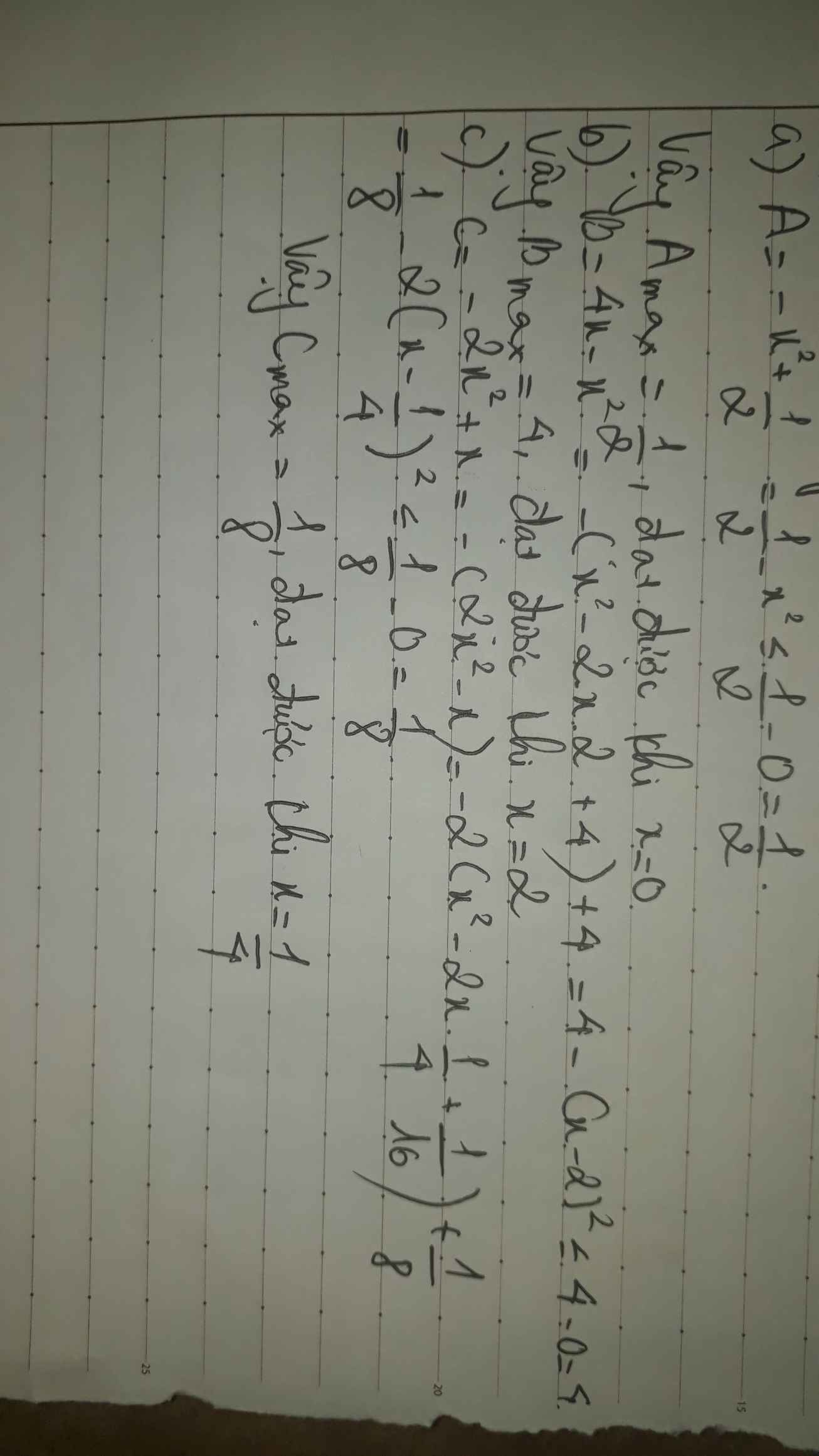Tìm GTLN: A=\(-x^2+7y^2-4xy+16y+2x-12\)
Hãy nhập câu hỏi của bạn vào đây, nếu là tài khoản VIP, bạn sẽ được ưu tiên trả lời.


\(A = - x^{2} - 7 y^{2} - 4 x y + 16 y + 2 x - 12\) \(= - \left(\right. x^{2} + 4 x y + 7 y^{2} \left.\right) + 2 x + 16 y - 12\) \(= - \left(\right. \left(\right. x + 2 y \left.\right)^{2} + 3 y^{2} \left.\right) + 2 x + 16 y - 12\)
ta có
\(u = x + 2 y \Rightarrow x = u - 2 y\)
ta thay
\(A = - \left(\right. u - 1 \left.\right)^{2} - 3 \left(\right. y - 2 \left.\right)^{2} + 1\)
Vì \(\left(\right. u - 1 \left.\right)^{2} \geq 0 , \left(\right. y - 2 \left.\right)^{2} \geq 0 \Rightarrow A \leq 1\)
ta có
\(\textrm{ }u=1,\textrm{ }y=2\textrm{ }\Rightarrow x=-3\)
vậy
\(maxA=1\text{t}ạ\text{i}\left(\right.x,y\left.\right)=\left(\right.-3,2\left.\right)\)


Answer:
3.
\(x^2+2y^2+2xy+7x+7y+10=0\)
\(\Rightarrow\left(x^2+2xy+y^2\right)+7x+7y+y^2+10=0\)
\(\Rightarrow\left(x+y\right)^2+7.\left(x+y\right)+y^2+10=0\)
\(\Rightarrow4S^2+28S+4y^2+40=0\)
\(\Rightarrow4S^2+28S+49+4y^2-9=0\)
\(\Rightarrow\left(2S+7\right)^2=9-4y^2\le9\left(1\right)\)
\(\Rightarrow-3\le2S+7\le3\)
\(\Rightarrow-10\le2S\le-4\)
\(\Rightarrow-5\le S\le-2\left(2\right)\)
Dấu " = " xảy ra khi: \(\left(1\right)\Rightarrow y=0\)
Vậy giá trị nhỏ nhất của \(S=x+y=-5\Rightarrow\hept{\begin{cases}y=0\\x=-5\end{cases}}\)
Vậy giá trị lớn nhất của \(S=x+y=-2\Rightarrow\hept{\begin{cases}y=0\\x=-2\end{cases}}\)

Thật ra cách làm dạng bài này cũng gần giống như bài tìm gtnn bạn vừa hỏi, chỉ khác ở chỗ đặt dấu âm ra ngoài để tìm được gtln thôi.

= 2\(x^{2}\) + 3y\(^{2}\) - 8\(x\) - 6y + 15
A = 2(\(x^{2}\) - 4\(x\) + 4) + 3(y\(^{2} - 2 y + 1\)) + 6
A = 2.(\(x - 2 \left.\right)^{2}\) + 3(y - 1)\(^{2}\) + 4
Vì (\(x - 2 \left.\right)^{2}\) ≥ 0; ∀ \(x\); (y -1)\(^{2}\) ≥ 0 ∀ y
⇒ 2.(\(x - 2 \left.\right)^{2}\) ≥ 0 ∀ \(x\); 3(y - 1)\(^{2}\) + 4 ≥ y ∀ y
2.(\(x - 2 \left.\right)^{2}\) + 3(y - 1)\(^{2}\) + 4 ≥ 4; Dấu bằng xảy ra khi:
\(\left{\right. x - 2 = 0 \\ y - 1 = 0\)
\(\left{\right. x = 2 \\ y = 1\)
Vậy A đạt giá trị nhỏ nhất là 4 khi (\(x ; y\)) = (2; 1)